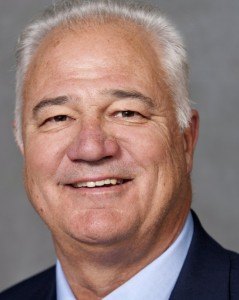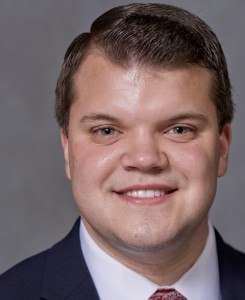Republicans Sturch, Finch face off in House District 63 primary
by February 18, 2016 1:01 pm 752 views

State Rep. James Sturch, R-Batesville, is being challenged in the March 1 primary by fellow Republican Phillip Finch of Batesville for the two-year term in the House to represent Independence County.
Sturch, who is in his first term, defeated Democrat Lackey Moody by a 61-39% margin in 2014, winning a seat that had been held by Democrat James McLean. No Democrats filed for the seat during the filing period in November.
Talk Business and Politics recently asked Sturch and Finch to answer questions about their district and their ideas.
BACKGROUND
• Phillip Finch
Cabot High School graduate (1975)
Graduated from the U.S. Air Force Academy in 1979 with a bachelor’s degree in engineering mechanics
Earned a master’s degree in systems management at St. Mary’s University
Air Force pilot for six years, and airline pilot 26 years
Cattleman for 22 years. Father of 3, grandfather of 1. Married to Bev for 37 years.
• State Rep. James Sturch, R-Batesville
I’m a lifelong resident of Independence County. I grew up in a modest household with my parents and one younger brother, Tim. My dad was trained as a computer technician and works at a Lumber company handling their inventory. He along with my grandfather, and brother are Baptist ministers. My mom has always been a homemaker, as she has epilepsy and has never been able to drive. From that experience, I learned how to take care of others and manage things at an early age. I really got involved with public service, not because my family was political, but I saw it as a way I could make a difference for my community since I didn’t have much means. I graduated from Southside High School and received a full scholarship to the University of Arkansas at Little Rock. I was the first one in my immediate family to go to college. I earned my BA degree in political science and secondary education, with certification to teach 7-12 Social Studies. I continued at UALR and earned a master’s degree in Public Administration.
TB&P: It has been said that your race is a battle between establishment and Tea Party Republicans. What is your message to your party in light of the ongoing debate?

Finch: I’m not sure what the definition of Tea Party is. But I am the more fiscally conservative of the two choices. My message to the voters is: Arkansas can’t continue to have the worst business climate of any state that touches ours or the highest taxes of any state that touches ours and expect our children to stay and prosper in Arkansas. Our state needs leaders who understand the problem is government.
Sturch: I find it a bit odd that people describe the race that way. I am the youngest member of the legislature and just finished my first year. I don’t know how I got labeled as part of the establishment so quickly. I’m just a Republican. It is never productive to circle the wagons and shoot inside. I believe now is the opportunity for my colleagues and party to show that conservative principles work, and we can govern well. Things won’t change overnight but we have made tremendous progress and are doing great things for the people of Arkansas. I don’t do negative campaigning. I find more and more people who would rather hear candidates focus on the issues and not their opposition.
TB&P: Your district covers Batesville, which has Lyon College and the University of Arkansas Community College, not to mention businesses like Bad Boy Mowers and Ozark Mountain Poultry. What would you say is the government’s role in economic development and workforce training?

Finch: Government should provide a safe environment for individuals and businesses to thrive, through low taxes and freedom. Workforce training generally turns into more wasteful, expensive government involvement. Partnerships between school and business are great, but should be generated by school and business not taxpayer money.
Sturch: I think the government plays a role in both of these. With connecting both workforce education and economic development, we have made tremendous progress in helping students find opportunities for technical certificates and jobs that are needed right here at home. From working with area businesses, both public schools and higher education institutions in my district have identified critical needs for our area and are working together to fill the void. Through innovative methods such as concurrent credit and value added diplomas, students are able to continue higher education if they wish or enter the workforce with skills that are sought after. Students who go on to welding school, or get an electrician’s license, etc. will be able to find a job in Independence County and the surrounding area and not have to move far away. The more we can develop our local economies to meet the needs of the 21st century, the better we retain bright, productive young people who otherwise would have had to look for opportunities elsewhere.
TB&P: What is your position on the Private Option? If you are in the legislature in 2017, how would you vote on Medicaid expansion?
Finch: The Private Option was a mistake not made by any of our neighbors. We should get out while we still can. I will vote to end Arkansas Works and restore the promise made to all working Arkansans in our Medicare system.
Sturch: This past session I voted for SB 96 because it was the only bill to make it to the full House for a vote to address the problems of private option and come up with an alternative plan at the end of 2016. I support the Governor’s initiative in trying to reform overall health care for Arkansans. We know that we to find common sense, fiscally responsible solutions and that takes time. We cannot afford the current path we are on. We have to find ways to address the problems of uninsured, uncompensated care, and find efficiencies in current programs. I know the Health Care Reform Task Force has been diligently working to present the full legislature options for reform. It is hard to answer how you would vote on a bill that hasn’t been written yet. I, like many of my colleagues, am interested in working from the solutions the Task Force recommends. A lot of what we do will also depend on the actions of the federal government. At both the state and federal levels, I am hoping together, we can come up with a solution that works.
TB&P: Batesville is considered by some to be the gateway to the Ozarks. The area has seen a lot of infrastructure growth and changes in the past several years. What is your opinion on the changes, including highway funding?
Finch: Batesville is the oldest existing city in Arkansas for a reason. We are geographically and demographically blessed. We have young people who want to make things and easy access to all the commodities needed to build those things. Infrastructure is a primary responsibility of state and local government. But Arkansas’ spending has become such a labyrinth of bureaucracy from DHS to education funding, little money is available for the things that would indeed help bring jobs.
Sturch: Tourism is one of the largest economic sectors for Arkansas. Independence County continues to benefit from the opportunity to be part of the Ozark Gateway. Last year, a new group was formed called Impact Independence County. The group was founded on the idea that it takes local partnerships to succeed in any project, especially when trying to improve a community. I support this citizen-led effort and their work to build a long-term plan for how to help the county be successful in the 21st century. Investing in infrastructure is one of the key facets of economic development (the others being a tax policy that is fair and better education opportunities). People want to see their tax dollars at work and we should strive to invest those dollars responsibly in something that all residents benefit from but also helps to improve our economy. Thus, finding a way to improve our highway system and maintain what we already have is going to be key for Arkansas’ future.
